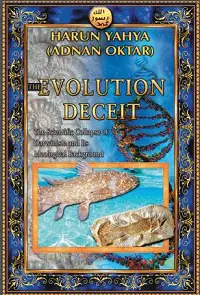|
TRANSLATE THIS ARTICLE
Integral World: Exploring Theories of Everything
An independent forum for a critical discussion of the integral philosophy of Ken Wilber
SEE MORE ESSAYS WRITTEN BY FRANK VISSER
The ‘Loopholes’ of
Neo-Darwinian Theory
Why Ken Wilber's Desperate Attempts
to Refute Darwinism Fail Miserably
Frank Visser
The problem is that creation scientists—who are almost entirely Christians—after having convincingly demonstrated that neo-Darwinian theory has loopholes large enough to drive several Hummers through—then try to prove that Jehovah is in one of the Hummers.
—Ken Wilber, Reposted on: Vomitting confetti, Friday, May 27, 2005 (now offline).
I am no fan of Intelligent Design either, which is just Creation Science in drag. But you don't need an intelligent designer to realize that evolution seems to involve some "creative allure", or what Whitehead called "the creative advance into novelty". That drive—Eros by any other name—seems a perfectly realistic conclusion, given the facts of evolution as we know them. Let's just say there is plenty of room for a Kosmos of Eros.
—Ken Wilber, Integral Spirituality, 2006, p. 236n.
Proponents of ID have one truth on their side: scientific materialism cannot explain all of evolution (it can explain pretty much everything except major holistic transformational leaps). With that, I quite agree.
—Ken Wilber, Integral Spirituality, 2006, p. 241-242n.
“Darwinism is a pagan pseudo-religion that regards chance as divine.” - Harun Yahya
As has been documented on this website many times, Ken Wilber's stance on the evolution/creation debate is: creationists point out "glaring" problems with Darwinism but fail to provide a believable alternative. His own Integral Theory, which postulates an Eros in the Kosmos—a driver for complexity and consciousness—supposedly does a better job. Also, I have mentioned on many occasions that creationists at least take the trouble to build their case with detailed accounts of biochemical or genetic processes. Wilber doesn't care about such details. He is content to conclude that these fundamentalists have done the dirty work for him, after which he can discard their backward religiosity so he can advance his more sophisticated, mystical view of the cosmos.
But do creationists have a case at all, when it comes to the supposed "loopholes" of neo-Darwinism? Shouldn't this be analyzed at least in a book length treatment, instead of through integral sound bites and slogans—or footnotes, for God's sake? I have pointed out many times that given the centrality of the metaphor of evolution within the integral body of knowledge, one would expect Wilber to carefully lay the foundation of this integral edifice, by deeply engaging with the various neo-Darwinist authors and researchers to make his point. That, however, has never happened, in the four decades that he has produced his works. What if the strategy of creationists fails? How will that reflect on the credibility of integral theory and its vast vistas of cosmic, biological and cultural evolution?
Of course, Wilber's core business doesn't revolve around matters of cosmology or biology; his main focus is on individual and cultural models of development. But to give a wider allure to his theories, or impress his readers who more often than not are not well-educated in science, he often throws out statements about these domains of matter and life, which cry out for some challenge.
 Adnan Oktar (Harun Yahya)
Adnan Oktar (Harun Yahya)
So let's see what creationists have to tell us. For a change, we will not use material from Christian fundamentalists, but from an Islamic source, Adnan Oktar, a Turkish author who writes under the pen-name of Harun Yahya, and is the author of lavishly illustrated books, such as The Atlas of Creation (2006, online), and more recently How Fossils Refute Darwinism (2016, online). We will focus on his earlier book The Evolution Deceit (1999, online), which summarizes his argument. Atlas has been distributed freely among scientists all over the world, which must have cost the author millions of dollars.[1] His literary output is quite extensive. Islamic fundamentalism is clearly getting a voice here.
The point of this essay is not that Wilber would subscribe to Oktar's particular fundamentalist Islamic views, or even that he would be a fan of his quite extravagant life style (he hosts a cable television show full of semi-nude women), but that he has repeatedly suggested that there is truth to be found in these anti-scientific publications, without providing any details himself other than that he finds them "convincing". By refuting these fundamentalist critiques, Wilber's strategy to find a scientific basis for his integral musings on evolution and its workings is severely hampered.
‘Chance is the false god of Darwinism’
Oktar's main argument is that life and its many forms cannot possibly have come about through chance. Curiously, this is Wilber's main argument as well. He famously stated in his best-selling A Brief History of Everything (1996):
 Ken Wilber
Ken Wilber
Calculations done by scientists from Fred Hoyle to F.B. Salisbury consistently show that twelve billion years isn't enough to produce even a single enzyme by chance.
In other words, something other than chance is pushing the universe. For traditional scientists, chance was their god. Chance would explain it all. Chance—plus unending time—would produce the universe. But they don't have unending time, and so their god fails them miserably. That god is dead. Something other than chance is pushing the universe… Chance is not what explains the universe; in fact, chance is what that universe is laboring mightily to overcome. Chance is exactly what the self-transcending drive of the Kosmos overcomes. (p. 23)
Ken Wilber is on the same page here with Oktar, who argues among the same lines, even to the point of calling chance the God of science:
According to Darwinists, all the wondrous variety of life on Earth came into being “BY CHANCE.” In order to avoid saying that “Allah created them” (surely Allah is beyond that), Darwinists have adopted chance as a god, in their own eyes, and claimed that blind, unconscious events represent the sole origin of these glorious and wonderfully complex living systems… Chance is the false god of Darwinism, that supposedly created everything and even works miracles. According to the shallow Darwinist world view, time and chance are, in some fantastical way, capable of bringing everything into being.
Darwinists who seek to account for the origin of life in evolutionary terms using utterly illogical scenarios ARE IN FACT UNABLE TO EXPLAIN HOW EVEN A SINGLE PROTEIN COULD COME INTO BEING SPONTANEOUSLY. That is the first and most important fact that should be known about Darwinist frauds.[2]
Strange bedfellows, Ken Wilber and Adnan Oktar, perhaps, but then again, perhaps not, as allies against Darwinism, or more widely interpreted, materialism.
These sweeping statements obscure the basic fact that chance is never the sole explanation in evolutionary theory or cosmology. Richard Dawkins has been very adamant on this point. He writes: "It is grindingly, creakingly, obvious that, if Darwinism were really a theory of chance, it couldn't work." (Climbing Mount Improbable, 1996, p. 67-8.) Instead, he argues that random variation (mostly based on chance) AND non-random selection together are responsible for the complexities of nature. Ernst Mayr, the late dean of evolutionary theory, was very clear about this:
An author who says "I cannot believe that the eye evolved through a series of accidents", documents that he or she simply does not understand the two-step nature of natural selection. [i.e. variation and selection/elimination]
—Ernst Mayr, What Evolution Is, p. 268, Appendix A. 'What criticisms have been made of evolutionary theory'
Still, this lack of basic understanding of evolutionary theory is rampant in integral circles. When I spoke to Roger Walsh briefly before giving my presentation on evolution at the Integral Theory Conference in 2010, he summarized the integral sentiment perfectly to me by saying: "I don't buy random chance". It is intellectual laziness to suppose that evolution is purely a matter of chance alone, and not of other lawful mechanisms that facilitate and drive the growth of complexity in nature.
This strategy of playing the chance card fails badly when it turns out that science can explain much more than the spiritualist or religionist claims it can.
‘FOSSILS REFUTE EVOLUTION’
Another main argument of Oktar is that, contrary to public perception, fossils actually don't support evolution. On the contrary, he claims, they show that organisms showed up in the past fully formed, and their fossils very much resemble contemporary species. Here are a few examples, taken from The Evolution Deceit:



Ancient fossils resemble current forms of life in great detail.
Source: Harun Yaha (Adnan Oktar), The Evolution Deceit, 1999, p. 63.
Apparently, Oktar is not a "Young Earth" creationist who believes all species were created more or less simultaneously, but an "Old Earth" creationist who accepts the geological timelines of science. The difference is that he believes, God created all creatures at a certain moment in geological history, "fully formed". Now this is, of course, a bit disingenious. If God is the Almighty Creator who could easily have created all species in one mighty move, why take billions of years that neatly fit into the timelines of geology and evolutionary theory, except that for some reason a divine intervention was needed to get each species started? So creation happened after all, but instead of 6.000 years ago, it occurred 550 millions years in the past, and admittedly over a period of a few million years? Or was God assembling parts before he put together organisms?
Evolution seems to be the exception that proves the rule of stasis, stability and stagnation.
Evolution seems to be the exception that proves the rule of stasis, stability and stagnation. After all, most fish are still fish. Most reptiles are still reptiles. Most mammals are still mammals. Only some went on to try something new. When there isn't an urgent need for evolution, organisms tend to remain adapted to their environments. But when conditions change, evolution kicks in for some lucky individuals. When rainfall declines, those plants who can tolerate draughts are selected for, and change is effected. In A Brief History of Everything (1996) Wilber acknowledges the jerky pattern of evolution, in which long periods of stasis are alternated by brief moments of evolutionary creativity, but just uses this as an opportunity to mystify the whole process by introducing Eros, the Spirit of Evolution.
Again, integralists have argued along the same lines, even if not in creationist terms. They would argue, echoing Wilber, that science can account for micro-evolution [the variations within species] but not for macro-evolution [the origin of species and larger groups themselves]. So what is the suggestion here: did Eros intervene time after time during geological history and kick-start millions of different species, letting them vary over time in various sub-species and variations? How likely is that? Given the complete absence of any notion of how this has occurred—since God or Eros works in mysterious ways—this anti-science approach would mean the end of all investigation. And fine to hear that science gets the details to work out even if it cannot cover the whole scheme of things.
‘THERMODYNAMICS FALSIFIES EVOLUTION’
A more interesting part of Oktar's The Evolution Deceit goes into the question of how complexity could have arisen given the Second Law of Thermodynamics. As I have described in a previous essay, the Second Law states that disorder will increase and order decrease in the universe.[3] In apparent(!) contradiction to this, evolution seems to produce more and more complexity (and even consciousness). This apparent contradiction or paradox can be resolved, in my opinion, by the insight that the growth of biological complexity is possible even in a dying and cooling universe at the expense of enormous amounts of energy. A rocket can defy gravity but it takes enormous amounts of energy to get to the moon. Wilber avoids this paradox by ridiculing the Second Law ("the whole notion of the universe as 'running down' is ridiculous"), but Oktar simply states that left to nature alone, complexity would never have emerged in the first place—hence creation.
Both Wilber and Oktar agree that on naturalistic grounds, evolution could never have gotten off the ground. Wilber has his Eros and Oktar his Allah to make this happen. Where Wilber suggests that, given the fact of evolution, the Second Law is of lesser importance, Oktar claims that given the Second Law, evolution is just not possible. Both invoke spiritual or quasi-spiritual principles to account for biological reality.
In this context, Oktar discusses two "myths" that have been discussed on Integral World many times over: the "myth of open systems" (p. 166) and the "myth of self-organization" (p. 167). The myth of open systems refers to the argument that the Second Law only holds true for closed systems, but not to the Earth as it is an "open system", since it is continuously fuelled by energy from the Sun. While that is true, he argues that energy influx by itself cannot create ordered forms, even if they are fully dependent on these energy flows to stay alive and multiply themselves. In the metaphor of a car: while a car needs gasoline, the gasoline has not created the car. Or one of my favorites: a sail boat can do nothing without the wind, but the wind hasn't created the boat. This in itself would be an argument for creation for creationists such as Oktar (and Wilber). He writes:
Indeed, the real problem confronting evolutionists is the question of how complex energy-converting mechanisms such as photosynthesis in plants, which cannot be duplicated even with modern technology, could have
come into being on their own. (p. 167)
Wouldn't that be a wonderful research programme, instead of giving up on investigating with scientific means such a problem?[4] It is here that creationists, again and again, make themselves vulnerable to science, which advances every day in explaining natural phenomena. If you have forgotten your biology classes, just check Wikipedia's "The Evolution of Photosynthesis" and read: "the process by which light energy synthesizes sugars from carbon dioxide, releasing oxygen as a waste product." As to how far science has understood how this intricate system has evolved, we read that parts of the photosynthetic processes in plants date from billions of years ago, and have a bacterial origin. Clearly the process of photosynthesis has evolved.
Admittedly, the process as a whole is unbelievably complex. But the spiritually minded will use this baffling complexity as a way to stop further investigation, whereas the scientifically minded person will use it to start breaking it down into smaller parts that can be understood. Thus we get insights such as:
There are three major metabolic pathways by which photosynthesis is carried out: C3 photosynthesis, C4 photosynthesis, and CAM photosynthesis. C3 photosynthesis is the oldest and most common form. C3 is a plant that uses the calvin cycle for the initial steps that incorporate CO2 into organic material. C4 is a plant that prefaces the calvin cycle with reactions that incorporate CO2 into four-carbon compounds. CAM is a plant that uses crassulacean acid metabolism, an adaptation for photosynthesis in arid conditions. C4 and CAM Plants have special adaptations that save water. (Wikipedia)
So perhaps we need to look at the molecular level to see that energy flows (such as the photons present in sunlight) may not be able to create molecules, but they can change their configuration, thus change the way they can support life's processes.
The second myth Oktar wants to put to rest is the myth of self-organization—a topic popular, but hardly understood in detail, by integralists. Scientists such as Prigogine (quoted by Wilber on several occasions as support for this own views of self-organization) clarified the process that under certain circumstances, "order-out-of-chaos" can arise in matter. Self-organization happens both in the abiotic and the biotic realm. Oktar makes a relevant distinction between order and organization. Waves of the sea that can create ordered patterns on a sandy beach, but they cannot create sand castles. For that, an intelligent mind is needed. This is, of course, the design argument used by creationists, who claim that "irreducible complexity" cannot possibly have been created by natural evolutionary processes. Trouble is that, again and again, science has exactly shown how such a step-by-step evolution could in principle be possible.
FLESHING OUT THE ARGUMENT
Credit to Oktar, then, for the fact that he at least fleshes out his argument against Darwinism—much more than Wilber has ever cared to do. But in both of their cases the effect of this strategy invariably is to stop researching and start believing in some spiritual Force, which must have created life's complexities—be it Eros, Allah or Jehova. This approach is not very fruitful, for with every advance of science one has to retreat back into the domains of science's yet unresolved problems, while it will never be able to shed any light on nature's processes on its own.
Wilber's arch-critic Geoffey Falk has pointed out the shortcomings of this approach, while discussing Wilber's (mis)treatment of the field of evolutionary theory[5]:
So what we have here from Wilber are no documented facts, no relevant details, just his "Einsteinian" authority, his rampant hyperbole, and a laughable appeal to other discredited "thinkers" to back up his own claims to expertise.
If [Ken Wilber] wants to make wild claims about the "failures" of Darwinian evolution in courtroom contexts and otherwise, he needs to do way more than simply throw out a smoke-screen of unsubstantiated claims (plus one book title).
And why did it take him nearly a decade to give any response at all to what is effectively just more of David Lane's critique of his misunderstandings of basic evolution, from 1996? Did he think that devastating critique was just going to go away? (Geoffrey Falk, "Wilberian Evolution", Norman Einstein, 2009, p. 11-12.)
As of 2018, this assessment still stands.
NOTES
[1] Cornelia Dean, "Islamic Creationist and a Book Sent Round the World", The New York Times, 2007.
[2] "Evolutionist's False God is Chance", evolutioninternational.net
[3] Frank Visser, "The Dissipative Universe and the Paradox of Complexity", www.integralworld.net.
[4] For an overview of research into photosynthesis see the magnificent: Oliver Morton, Eating the Sun: How Plants Power the Planet, Harper Perennial, 2008.
[5] Geoffrey Falk, Norman Einstein: The Dis-Integration of Ken Wilber, Million Monkeys Press (April 3, 2009)
|

 Frank Visser, graduated as a psychologist of culture and religion, founded IntegralWorld in 1997. He worked as production manager for various publishing houses and as service manager for various internet companies and lives in Amsterdam. Books: Ken Wilber: Thought as Passion (SUNY, 2003), and The Corona Conspiracy: Combatting Disinformation about the Coronavirus (Kindle, 2020).
Frank Visser, graduated as a psychologist of culture and religion, founded IntegralWorld in 1997. He worked as production manager for various publishing houses and as service manager for various internet companies and lives in Amsterdam. Books: Ken Wilber: Thought as Passion (SUNY, 2003), and The Corona Conspiracy: Combatting Disinformation about the Coronavirus (Kindle, 2020). 




